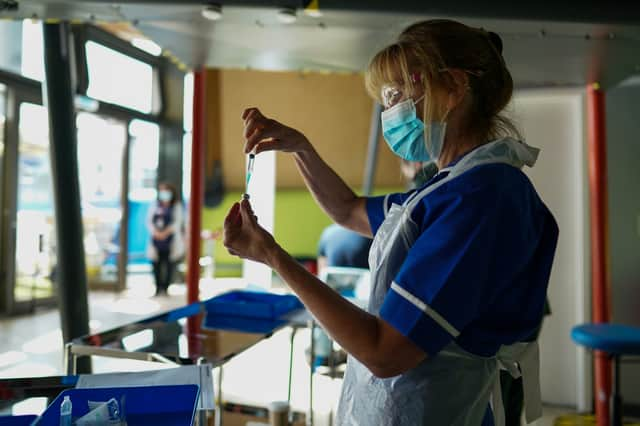Thousands urged to bring second Covid vaccine appointment forward ahead of lockdown easing


The NHS is urging hundreds of thousands of people to bring their second Covid-19 vaccine appointment forward ahead of lockdown restrictions being eased.
Coronavirus cases are expected to surge after the remaining measures are removed on the so-called ‘freedom day’ on 19 July in England, with health experts warning Covid-related deaths could rise to 200 per day.
12 week gap cut to 8
Advertisement
Hide AdAdvertisement
Hide AdAround 650,000 people will receive a text message this week asking them to make sure their second vaccine appointment is eight weeks after the first.
Guidance originally said vaccine doses should be up to 12 weeks apart, with a longer delay between doses helping to boost immunity and allowing the constrained vaccine supply earlier in the year to reach more people.
The Joint Committee on Vaccination and Immunisation (JCVI) has now changed its stance to recommend people get their second dose between eight and 12 weeks after the first.
The drive to reduce the timing between doses comes ahead of lockdown restrictions lifting in England on 19 July in a bid to maximise vaccinations
Advertisement
Hide AdAdvertisement
Hide AdWhen booking a vaccine appointment, people will now be asked to select a date for their second dose closer to the first, reducing the gap to eight weeks.
Two doses 'crucial' for Covid protection
Sir Keith Willett, head of the Covid-19 vaccination programme in England, warned that getting the second vaccine dose is “crucial” to ensure maximum protection against Covid-19, and urged people to attend both appointments.
He said: “The crucial second dose gives maximum protection against the virus and it will protect you, your family and those around you.
“As we approach July 19, there has never been a more important time to get jabbed and it has never been easier – from pop-up sites in the community to walk in centres, NHS staff are going to great lengths to ensure vaccines are as convenient as possible.
Advertisement
Hide AdAdvertisement
Hide Ad“So I urge everyone to bring their second-dose appointment forward to eight weeks as soon as they can.”
The text invitations will appear as an alert from “NHSvaccine” and include a web link to the NHS website to reserve an appointment.
Those who cannot book online can instead call the NHS service on 119 to arrange their jab.
Health Secretary Sajid Javid added: “Getting that vital second jab will also allow us to return to doing the things we missed, such as going on holiday.
Advertisement
Hide AdAdvertisement
Hide Ad“Everyone should take up the opportunity as soon as they can so we can all start to enjoy the freedoms we’ve missed.”
The call to bring the second vaccine dose forward comes after vaccination experts initially said there was “no gain” in reducing the time between jabs.
With the threat of rising coronavirus infections, experts assessed if there could be benefit from cutting the gap even further still from eight to four weeks between doses. However, it was decided there is no short or long-term gain by shortening the interval.
Professor Anthony Harnden, deputy chair of the JCVI, told Times Radio: “We’ve looked at this data very carefully over the last few days and it is quite clear from the AstraZeneca vaccine, there is absolutely no doubt that the longer interval gives you much better protection.
Advertisement
Hide AdAdvertisement
Hide Ad“But we concentrated on the Pfizer vaccine because of course that’s one that’s been given to younger people at the moment.
“And it’s quite clear from antibody T-cells studies that you get much lower response, and poorer quality memory response with the shorter interval – that’s a four-week interval compared to an eight-to-12-week interval.
“And the actual real data vaccine effectiveness studies show that there is a lower vaccine efficacy against symptomatic disease with shorter intervals compared to longer intervals.
“Then we got the modellers to look at this and actually, the number of infections will rise if we reduce the dose.”
Key numbers
Advertisement
Hide AdAdvertisement
Hide AdMore than 80 million Covid-19 vaccine doses have now been administered in the UK, 45 million of which are first doses.
A total of 34.8 million people are now fully vaccinated against coronavirus, amounting to 52.2 per cent of the population.
The figures differ slightly across the UK’s four nations, with Wales having the highest proportion of its population vaccinated. Here’s how the stats compare:
- England - 29.1 million fully vaccinated, amounting to 52 per cent of the population
- Scotland - 2.8 million fully vaccinated, amounting to 52.8 per cent of the population
- Wales - 1.83 million fully vaccinated, amounting to 58.2 per cent of the population
- Northern Ireland - 938k million fully vaccinated, amounting to 49.8 per cent of the population